
 By Miranda Milana, Psy.D.
By Miranda Milana, Psy.D.
Pediatric Neuropsychologist
With the start of the school year well underway, we are beginning to see students and teachers settling into their classroom routines. Along with this increase in familiarity and comfortability, parents often start to see bits and pieces of challenges arise around this time of year that may have gone unnoticed during the initial “honeymoon period.” You may be wondering what challenges you should be looking out for and when those challenges warrant an evaluation to determine further supports and services. Let’s take some time to explore what to keep an eye on, and when it might be time to reach out to schedule an evaluation to dive a bit deeper into what is going on.
Academics
No matter their age, if you ever feel your child is inundated and overwhelmed with schoolwork, it is a great idea to reach out to their teachers; ask how long homework should be taking and whether it should feel like review vs. new material. If homework starts to consistently become a battle, it might be worth taking a closer look into why. It could be because it’s a new and appropriately challenging course. It could also be because there are underlying language-based learning disabilities, a nonverbal learning disability, executive function challenges, or increasing symptoms of anxiety or depression. Some specific things to watch for:
- Frequent tears during homework that appear to be getting worse instead of better
- Not appearing to “get it” even after review and repetition
- Difficulty studying/holding information in memory
- Dysfluent reading or not understanding what they’ve read
- Challenges understanding math concepts or memorizing math facts
- Difficulty applying and generalizing concepts
- Opposition to handwriting tasks or when asked to compose a writing assignment
- Poor penmanship that is illegible and/or immature for age
- Not meeting benchmarks on assessments
Social Skills
At this point in the school year, children are typically starting to be interested in other peers within their classrooms. For younger kids, they are likely to feel more comfortable interacting with other children in their play. Common social concerns can include:
- Not remembering any names or faces of kids in their class
- Preferring to play alone; hesitant to join in with a group
- Appearing unaware of social cues or how to initiate conversation with others
- Rigidity in play – always wanting to play their own game by their own specific rules
- Frequent peer conflicts and feeling rejected or left out
Emotional Functioning
A new school year often elicits feelings of anxiety in kids no matter how outgoing and social they may be! When might it be a sign that there is something more?
- Continued and persistent resistance to going to school
- Frequent somatic complaints with no apparent cause (e.g., headaches, stomachaches)
- Change in sleeping patterns – not being able to fall asleep at night or waking up frequently
- Difficulty with regulating their emotions/frequent tantrums
- Changes in appetite
- Negative statements about themselves
- Increase in irritability
- Withdrawal from others or previously preferred activities
- Always wanting to know what is happening next and struggling with changes in routine (i.e., Does a substitute teacher derail their whole day? If a friend is out sick, is there a perseveration on where they are? Do you wait to tell them about changes in plans so they don’t worry in advance?)
Attention/Focus
Have you ever found yourself feeling restless and distracted when sitting through a work meeting? Kids are no different! Sitting still and paying attention for extended periods of time can be really tough – especially after being on summer break! Here are a few things to keep an eye on:
- Frequently fidgeting in their seat or needing a fidget item to increase concentration
- Difficulty with multi-step directions
- Not remembering information presented during lectures
- Acting impulsively
- Easily distracted/daydreaming
- Acting as if running by a motor
- Blurting out thoughts, interrupting conversations
- Teacher feedback that they are interrupting other students or not able to sit quietly and attend to class discussions
As always, you know your child best! If you feel like this year is off to a rocky start, or you’re starting to have questions regarding their functioning, do not hesitate to reach out and schedule an evaluation. A comprehensive neuropsychological evaluation is designed to look at ALL aspects of a child to determine what is getting in their way of reaching their potential. We are always here to help!
About the Author
Dr. Miranda Milana provides comprehensive evaluation services for children, adolescents, and young adults with a wide range of concerns, including attention deficit disorders, communication disorders, intellectual disabilities, and learning disabilities. She particularly enjoys working with children and their families who have concerns regarding an autism spectrum disorder. Dr. Milana has received specialized training on the administration of the Autism Diagnostic Observation Schedule (ADOS).
attention deficit disorders, communication disorders, intellectual disabilities, and learning disabilities. She particularly enjoys working with children and their families who have concerns regarding an autism spectrum disorder. Dr. Milana has received specialized training on the administration of the Autism Diagnostic Observation Schedule (ADOS).
Dr. Milana places great emphasis on adapting her approach to a child’s developmental level and providing a testing environment that is approachable and comfortable for them. She also values collaboration with families and outside providers to facilitate supports and services that are tailored to a child’s specific needs.
Before joining NESCA, Dr. Milana completed a two-year postdoctoral fellowship at Boston Children’s Hospital in the Developmental Medicine department, where she received extensive training in the administration of psychological and neuropsychological testing. She has also received assessment training from Beacon Assessment Center and The Brenner Center. Dr. Milana graduated with her B.A. from the University of New England and went on to receive her doctorate from William James College (WJC). She was a part of the Children and Families of Adversity and Resilience (CFAR) program while at WJC. Her doctoral training also included therapeutic services across a variety of settings, including an elementary school, the Family Health Center of Worcester and at Roger Williams University.
Dr. Milana grew up in Maine and enjoys trips back home to see her family throughout the year. She currently resides in Wrentham, Massachusetts, with her husband and two golden retrievers. She also enjoys spending time with family and friends, reading, and cheering on the Patriots, Bruins, Red Sox, and Celtics.
To book an appointment with Dr. Miranda Milana or another expert NESCA neuropsychologist, please complete our Intake Form today.
NESCA is a pediatric neuropsychology practice and integrative treatment center with offices in Newton, Plainville, and Hingham, Massachusetts; Londonderry, New Hampshire; the greater Burlington, Vermont region; and Coral Gables/Miami, Florida, serving clients from infancy through young adulthood and their families. For more information, please email info@nesca-newton.com or call 617-658-9800.


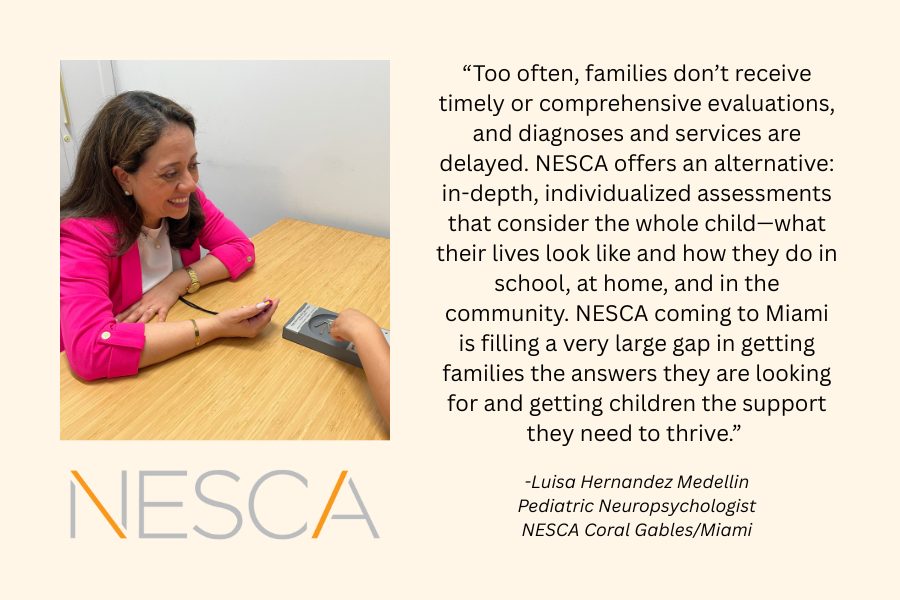
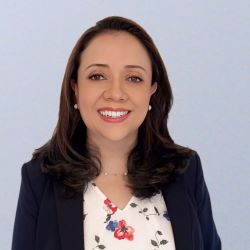 About the Author
About the Author By
By  practicing neuropsychology for 35 years and has been director of NESCA’s Neuropsychology practice for nearly three decades, continuously training and mentoring neuropsychologists to meet the highest professional standards.
practicing neuropsychology for 35 years and has been director of NESCA’s Neuropsychology practice for nearly three decades, continuously training and mentoring neuropsychologists to meet the highest professional standards.
 and developmental disabilities. She has a particular interest in children with autism spectrum disorders, intellectual disabilities, and those with complex medical histories. In addition, she evaluates adults who have concerns about whether they meet criteria for an ASD or ADHD diagnosis.
and developmental disabilities. She has a particular interest in children with autism spectrum disorders, intellectual disabilities, and those with complex medical histories. In addition, she evaluates adults who have concerns about whether they meet criteria for an ASD or ADHD diagnosis.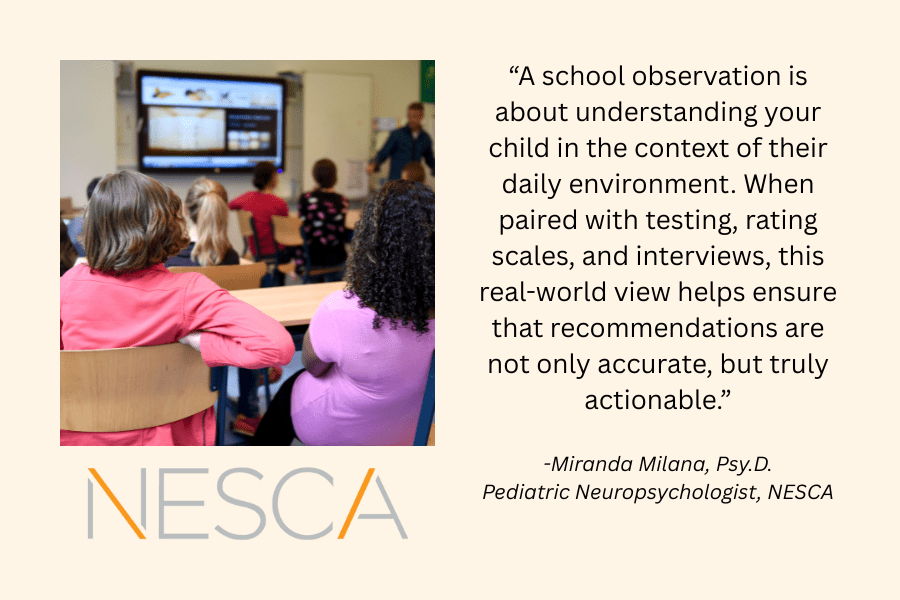
 attention deficit disorders, communication disorders, intellectual disabilities, and learning disabilities. She particularly enjoys working with children and their families who have concerns regarding an autism spectrum disorder. Dr. Milana has received specialized training on the administration of the Autism Diagnostic Observation Schedule (ADOS).
attention deficit disorders, communication disorders, intellectual disabilities, and learning disabilities. She particularly enjoys working with children and their families who have concerns regarding an autism spectrum disorder. Dr. Milana has received specialized training on the administration of the Autism Diagnostic Observation Schedule (ADOS).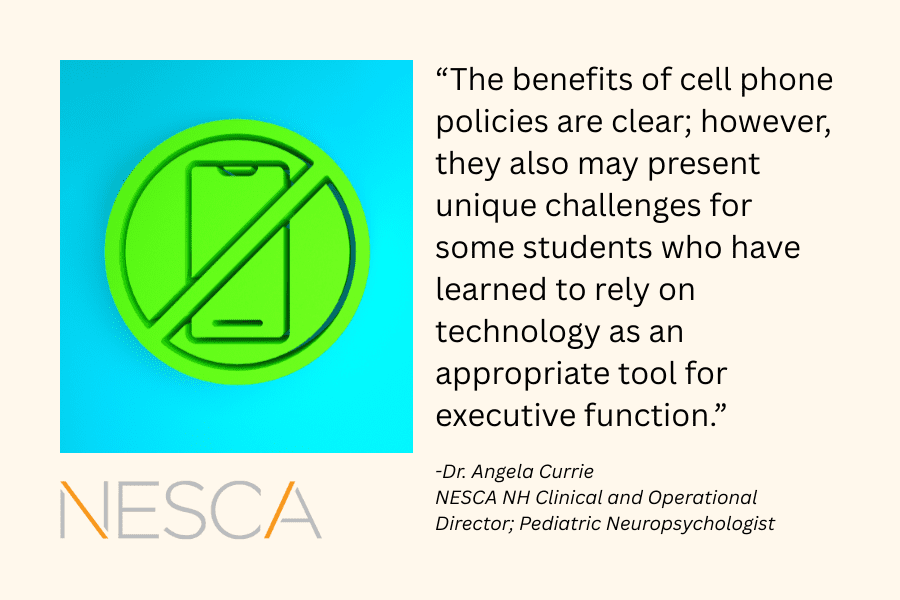

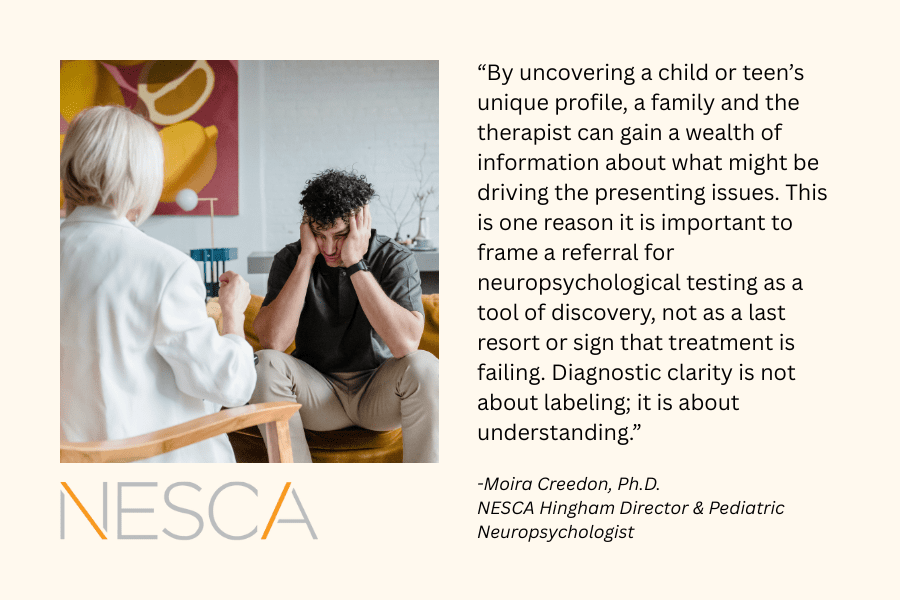
 is interested in uncovering an individual’s unique pattern of strengths and weaknesses to best formulate a plan for intervention and success. She tailors each assessment to address a range of referral questions, such as developmental disabilities, including Autism Spectrum Disorder, learning disabilities, attention challenges, executive functioning deficits, and social-emotional struggles. She also evaluates college-/grad school-age/adult individuals with developmental issues, such as ASD and ADHD, particularly when there is a diagnostic clarity or accommodation question.
is interested in uncovering an individual’s unique pattern of strengths and weaknesses to best formulate a plan for intervention and success. She tailors each assessment to address a range of referral questions, such as developmental disabilities, including Autism Spectrum Disorder, learning disabilities, attention challenges, executive functioning deficits, and social-emotional struggles. She also evaluates college-/grad school-age/adult individuals with developmental issues, such as ASD and ADHD, particularly when there is a diagnostic clarity or accommodation question.


 With NESCA since its inception in 2007, Dr. Talamo had previously practiced for many years as a child and adolescent clinical psychologist before completing postdoctoral re-training in pediatric neuropsychology at the Children’s Evaluation Center.
With NESCA since its inception in 2007, Dr. Talamo had previously practiced for many years as a child and adolescent clinical psychologist before completing postdoctoral re-training in pediatric neuropsychology at the Children’s Evaluation Center.
Connect with Us